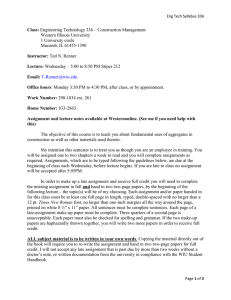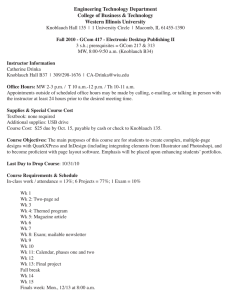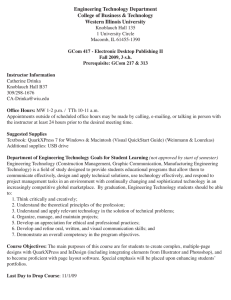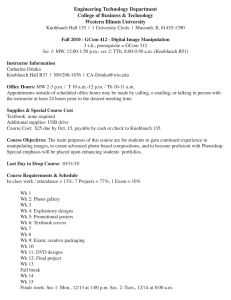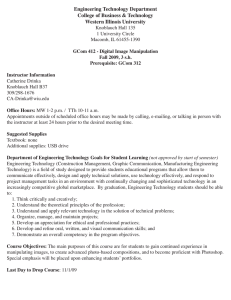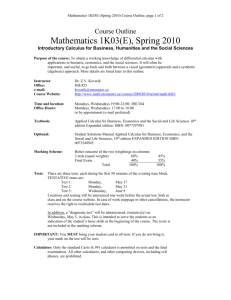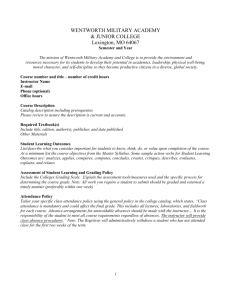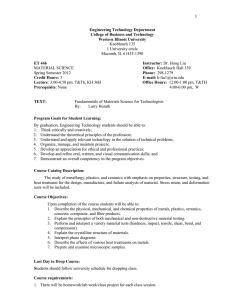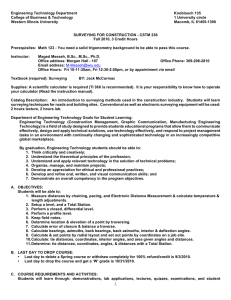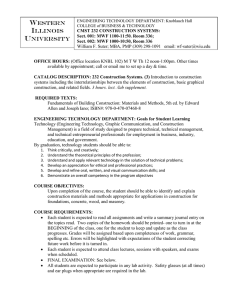Engineering Technology Department
advertisement
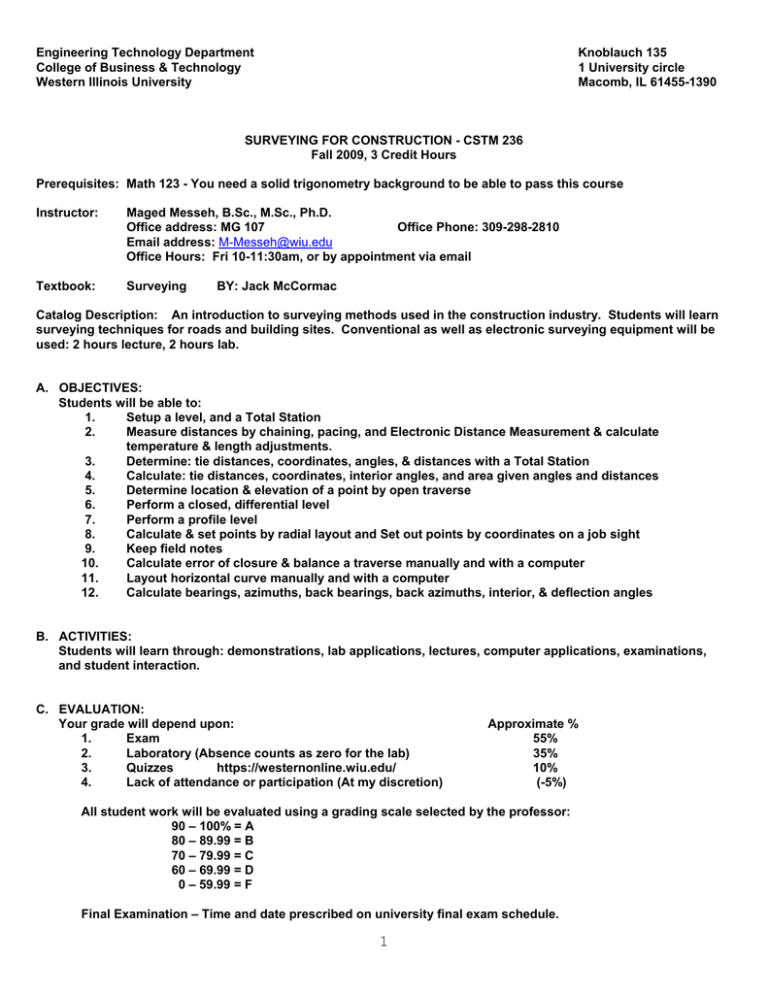
Engineering Technology Department College of Business & Technology Western Illinois University Knoblauch 135 1 University circle Macomb, IL 61455-1390 SURVEYING FOR CONSTRUCTION - CSTM 236 Fall 2009, 3 Credit Hours Prerequisites: Math 123 - You need a solid trigonometry background to be able to pass this course Instructor: Maged Messeh, B.Sc., M.Sc., Ph.D. Office address: MG 107 Office Phone: 309-298-2810 Email address: M-Messeh@wiu.edu Office Hours: Fri 10-11:30am, or by appointment via email Textbook: Surveying BY: Jack McCormac Catalog Description: An introduction to surveying methods used in the construction industry. Students will learn surveying techniques for roads and building sites. Conventional as well as electronic surveying equipment will be used: 2 hours lecture, 2 hours lab. A. OBJECTIVES: Students will be able to: 1. Setup a level, and a Total Station 2. Measure distances by chaining, pacing, and Electronic Distance Measurement & calculate temperature & length adjustments. 3. Determine: tie distances, coordinates, angles, & distances with a Total Station 4. Calculate: tie distances, coordinates, interior angles, and area given angles and distances 5. Determine location & elevation of a point by open traverse 6. Perform a closed, differential level 7. Perform a profile level 8. Calculate & set points by radial layout and Set out points by coordinates on a job sight 9. Keep field notes 10. Calculate error of closure & balance a traverse manually and with a computer 11. Layout horizontal curve manually and with a computer 12. Calculate bearings, azimuths, back bearings, back azimuths, interior, & deflection angles B. ACTIVITIES: Students will learn through: demonstrations, lab applications, lectures, computer applications, examinations, and student interaction. C. EVALUATION: Your grade will depend upon: 1. Exam 2. Laboratory (Absence counts as zero for the lab) https://westernonline.wiu.edu/ 3. Quizzes 4. Lack of attendance or participation (At my discretion) Approximate % 55% 35% 10% (-5%) All student work will be evaluated using a grading scale selected by the professor: 90 – 100% = A 80 – 89.99 = B 70 – 79.99 = C 60 – 69.99 = D 0 – 59.99 = F Final Examination – Time and date prescribed on university final exam schedule. 1 Any exceptions to the final exam schedule must be approved by department chair and the Dean of the College of Business and Technology in writing including student’s name, ID# and signatures. Rules for Giving an Incomplete WIU policy – A temporary symbol of ‘I’ (Incomplete) for a course may be given only when a student, due to circumstances beyond his or her control, has been unable to complete the course requirements within the official limits of the term. The circumstances must be documented to the instructor’s satisfaction. D. COURSE POLICY: • Attendance: Mandatory • Special Costs: To help cover the costs of this course, a special cost of $25.00 will be charged to each student. This is payable to Kristin in Knoblauch 135 by October 1, 2009. • Western Online quizzes must be completed during the allotted time. It is your responsibility to check. • Academic misconduct: Cheating on an exam or a Lab assignment will result in a Zero for that exam or lab grade and possible proceedings for dismissal from the university (see section on Academic Integrity). • A scientific calculator is required (TI 36X is recommended). It is your responsibility to know how to operate your calculator (Read the instruction manual). • The Syllabus is subject to change with notice. • Last day to delete a Fall course or withdraw completely for 100% refund/credit is 9/4/2009. • Last day to drop the course and get a ‘W’ grade is 11/1/2009. E. ACADEMIC INTEGRITY: Preamble Western Illinois University, like all communities, functions best when its members treat one another with honesty, fairness, respect, and trust. Students have rights and responsibilities (http://www.wiu.edu/provost/students/) and students should realize that deception for individual gain is an offense against the members of the entire community, and it is the student's responsibility to be informed and to abide by all University regulations and policies on Academic Integrity. Plagiarism, cheating, and other forms of academic dishonesty constitute a serious violation of University conduct regulations. Students who engage in dishonesty in any form shall be charged with academic dishonesty. It is a duty of faculty members to take measures to preserve and transmit the values of the academic community in the learning environment that they create for their students and in their own academic pursuits. To this end, they are expected to instill in their students a respect for integrity and a desire to behave honestly. They are also expected to take measures to discourage student academic dishonesty, to adjust grades appropriately if academic dishonesty is encountered, and, when warranted, to recommend that additional administrative sanctions be considered. Grading policies are the exclusive prerogative of the faculty; administrative sanctions are under the authority of the Director of Student Judicial Programs. This document provides policies and procedures to be followed when academic dishonesty is encountered. Definitions of Academic Dishonesty The following definitions and examples are not meant to be exhaustive. The University reserves the right to determine, in a given instance, what action constitutes a violation of academic integrity. See www.wiu.edu/policies/acintegrity.php for complete descriptions of the following topics: 1. Plagiarism 2. Fabrication and Falsification 3. Cheating 4. Complicity in Academic Dishonesty 5. Abuse of Academic Materials 6. Multiple Submissions Reporting Academic Dishonesty All members of the University community share the responsibility and authority to challenge and make known acts of apparent academic dishonesty. Any student, faculty member, or staff person who has witnessed an apparent act of student academic dishonesty, or has information that reasonably leads to the conclusion that such an act has occurred or has been attempted, has an ethical responsibility for reporting said act(s). Confronting and reporting academic dishonesty can be done in a variety of ways, and people should choose the manner most appropriate for the circumstances. Acts of apparent academic dishonesty that occur in the classroom should be reported directly to 2 the course instructor, and/or the course instructor's Department Chair, and/or the instructor's College Dean. The Council on Admission, Graduation, and Academic Standards (CAGAS) or the Graduate Council will not accept or act upon anonymous reports, but will hold in strict confidence the identity of any person reporting a suspected instance of academic dishonesty, unless that person consents to having his/her identity revealed. F. ACCESS & DISABILITIES: In accordance with University policy and the Americans with Disabilities Act (ADA), academic accommodations may be made for any student who notifies the instructor of the need for an accommodation. For the instructor to provide the proper accommodation(s), you must obtain documentation of the need for an accommodation through Disability Support Services and provide it to the instructor. It is imperative that you take the initiative to bring such needs to the instructor's attention, as he/she is not legally permitted to inquire about such particular needs of students. Students who may require special assistance in emergency evacuations (i.e. fire, tornado, etc.) should contact the instructor as to the most appropriate procedures to follow in such an emergency. Contact Disability Support Services at 298-2512 for additional services. If you have emergency medical information to share with me, if you need special arrangements in case the building must be evacuated, or if you need accommodations in this course because of a disability, please make an appointment with me as soon as possible. My office location and hours are at the top of this syllabus. If you plan to request disability accommodations, you are expected to register with the Disability Support Services (DSS) at 2982512. G. RESOLUTION OF PROBLEMS: Should a problem occur, students should speak to their instructor first. If the problem is not resolved, meet with the chair of the department. If the problem continues to be unresolved, go to the College of Business and Technology’s Dean. Students should observe the following sequence for the resolution of problems: Student --- Instructor --- Chairperson --- Dean 3
